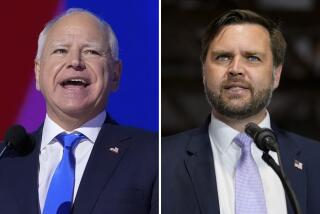Bipartisan Group to Sponsor L.A. Debate After League of Women Voters Drops Out
- Share via
WASHINGTON — The League of Women Voters, accusing both candidates of insisting on ground rules that would “perpetrate a fraud on the American public,” Monday withdrew its sponsorship of the second and final debate scheduled to be held between Vice President George Bush and Gov. Michael S. Dukakis.
The bipartisan Commission on Presidential Debates--sponsor of the first Bush-Dukakis encounter in Winston Salem, N. C., and the vice presidential debate scheduled Wednesday in Omaha--quickly agreed to take over sponsorship of the Los Angeles debate at the request of the two candidates.
“The commission is delighted to respond positively to the invitation and regards it as a vote of confidence in the commission’s approach to the debate,” said Janet Brown, executive director of the commission. “We hope to be able to make an announcement in the next day or so about funding partners.”
‘Local Partners’
Brown said the group, which was formed by the two national parties, was seeking “local partners” to help finance the debate.
The group was invited to become the new sponsor by Dukakis campaign Chairman Paul P. Brountas and Bush Chairman James A. Baker III after the two men talked by telephone.
The league had reserved the Shrine Auditorium in Los Angeles for the debate and had already issued invitations to community leaders to attend the event, which is scheduled for Oct. 13 or 14, depending upon the baseball playoff schedule.
In withdrawing its sponsorship, the league expressed “outrage” that the two candidates already had agreed to stringent ground rules on staging, format and other details without consulting the league.
Restrictions Seen
Nancy M. Neuman, the league president, contended at a press conference here that the campaigns have so controlled the format that questioning by a panel of journalists will be subject to “very clear restrictions in terms of what they can ask.”
“The league has no intention of becoming an accessory to the hoodwinking of the American public,” she said.
Neuman said the two campaigns negotiated their debate agreement “behind closed doors” and presented it to the league as “a done deal” on Sept. 28, just two weeks before the scheduled debate. The league’s 14-member board of trustees voted unanimously to withdraw its sponsorship, she said.
Neuman released copies of the detailed agreement reached by the two campaigns, which appeared to be the general agreement that also covered the first debate. In that format, which closely resembled the form taken in debates sponsored by the league itself in previous campaigns, a panel of journalists asked questions of the candidates.
Heart of Dispute
She acknowledged that the panel was “able to get around” some of the limitations placed on it at the Winston-Salem debate and that the league’s lack of involvement in the agreement was at the heart of the dispute.
“The issue is, who’s in control of the debate,” she said.
When asked what restrictions the journalists faced, she cited the requirement that the moderator’s script be approved by the campaigns. She also objected to the presence of a telephone line from each campaign to the debate’s television producer, and to the pattern for rebuttal and follow-up questions.
Lobbied Vigorously
The Commission on Presidential Debates was set up by the two parties in part because of their discontent with the league’s sponsorship of debates in previous presidential elections. But the league lobbied vigorously for a role in the 1988 debates, and the campaigns ultimately agreed to two debates, one sponsored by the commission and one by the league, plus a vice presidential debate under commission sponsorship.
Bush campaign officials privately belittled the league’s complaints as “nit-picking items.” The Associated Press reported that one Bush campaign source, speaking on condition of anonymity, said the league’s action “guarantees they’re out of the debate business for good. They made the mistake of misunderstanding their role.”
Democratic Chairman Paul G. Kirk Jr., declaring that he does not “understand the league’s problem” with the debate guidelines, said: “The league has pulled out of presidential debates forever as far as I’m concerned.”
More to Read
Get the L.A. Times Politics newsletter
Deeply reported insights into legislation, politics and policy from Sacramento, Washington and beyond. In your inbox twice per week.
You may occasionally receive promotional content from the Los Angeles Times.










